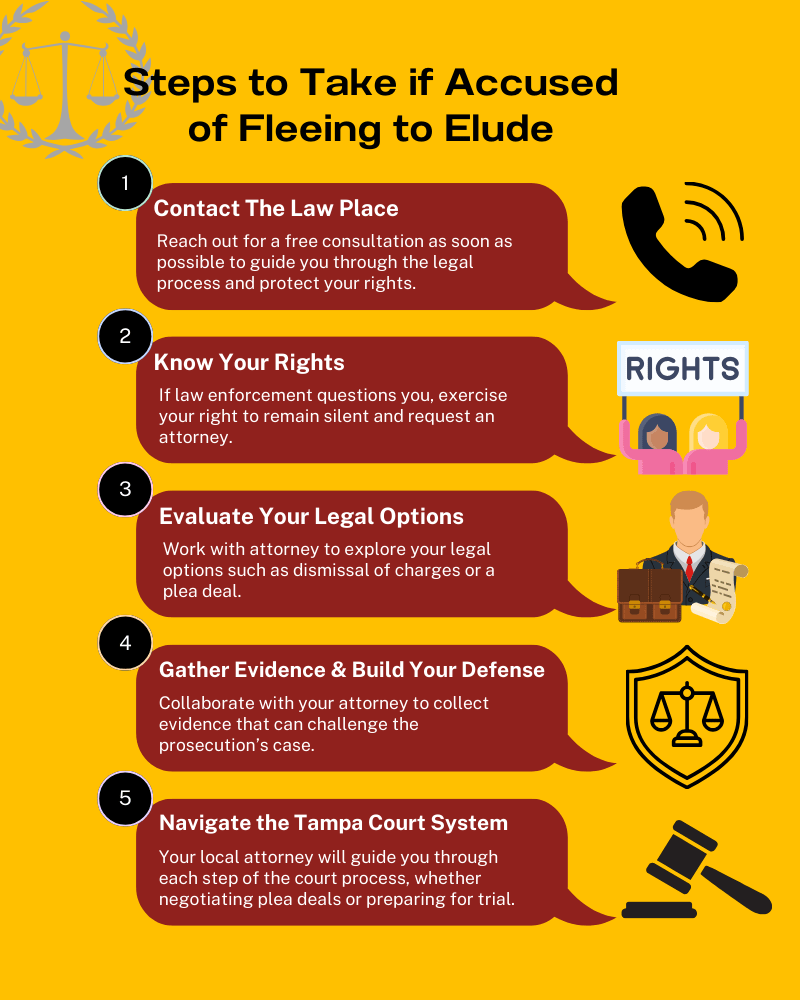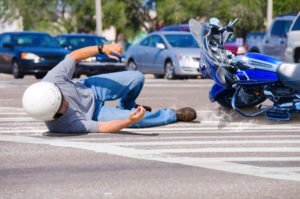
Years of television have conditioned the average resident of Florida to believe that fleeing to elude always involves a high-speed car chase. However, it may surprise you how easily you could be apprehended on these charges. For example, failing to stop or leaving the scene when commanded by a law enforcement officer can result in fleeing to evade charges, no matter the speed of your vehicle. In this case, you could be looking at a third-degree criminal charge.
As a convicted felon for fleeing to elude, your records will not be able to be expunged or sealed . This means the criminal record you incur will follow you forever, even outside Florida.
Luckily, it doesn’t have to get to that stage. A sufficiently skilled and experienced Tampa criminal defense attorney may very well be able to get charges against you reduced or even dropped entirely. This means you may never acquire a criminal record at all. Here at The Law Place , our criminal attorney defense team has 75 years of experience between them. We have won many fleeing to avoid cases in the past and are here to help you in the future.
If you are facing charges of fleeing to elude or aggravated fleeing to elude a law enforcement officer, we can help you with your case. If you would like more information or free legal advice, contact us today over the telephone for a free consultation. Each free consultation will be at no obligation, and your confidentiality will be entirely protected by the attorney-client relationship.
If you have been accused of fleeing to avoid in Tampa, call our office at (941) 444-4444 today!

Steps to Take if Accused of Fleeing to Elude in Tampa
The Attorneys at The Law Place
At The Law Place, our team of dedicated attorneys brings together over 75 years of combined experience in criminal defense across Florida, including cases involving fleeing to elude charges. Our attorneys work collaboratively on every case, pooling their knowledge and skills to ensure the strongest defense for our clients. Attorneys like David Haenel and Darren Finebloom have extensive backgrounds in criminal law and have successfully handled complex cases throughout Florida. At The Law Place, we believe in providing compassionate, straightforward guidance, always keeping our clients’ best interests at the forefront.

What Are the Parameters of the Fleeing to Elude Laws in Florida?
The exact legal scope of the laws concerning fleeing to elude a law enforcement officer in Tampa are covered in Florida Statute 316.1935.
This statute states that to secure a successful legal conviction, the burden of proof beyond a reasonable doubt for the prosecution is as follows:
- The accused willfully and deliberately failed in their duty to comply with an order to stop given by a police officer.
- The accused willfully and deliberately fled from the police officer, either in their motor vehicle or on foot.
- The accused was operating a motor vehicle on a Florida highway or street.
- The accused stopped their motor vehicle and proceeded to willfully and deliberately flee to elude the police officer.
This leaves plenty of scope for an experienced criminal defense attorney to establish a solid defense around the specifics of your case. In addition, there are several requirements on the part of the arresting law enforcement officer, which, if not fulfilled, would invalidate the charges against you.
 We’re here to serve you. Our phones are open 24 hours a day.
We’re here to serve you. Our phones are open 24 hours a day.
The Penalties for Attempting to Flee and Elude a Law Enforcement Officer in Tampa, Florida
If you are charged with the offense of fleeing to elude an officer in Florida, you should be aware that consequences can be very severe. As it is a felony-level offense, if you are convicted, the consequences will be lifelong.
A standard, non-aggravated, case of fleeing to elude can result in:
- Imprisonment for a maximum period of five years.
- A period of five years under probation.
- A fine which can go as high as $5,000.
- Your license will be suspended for a minimum period of one year.
- A guilty verdict for fleeing to elude a law enforcement officer, which will stay on your criminal record for life.
A third-degree felony charge of this kind on your criminal record will never be able to be expunged or sealed, even by the most skilled criminal defense attorney, due to the way the law works. This will mean all your future employers will have access to the information, which can reduce your chances of gaining worthwhile employment or impact the competitiveness of your pay. Additionally, you will suffer from permanently raised insurance premiums for any vehicle you may own in the future.
Therefore, it is important to get out in front of the charges against you. A good Tampa criminal defense attorney will fight their hardest to get the charges leveled against you, either reduced or dismissed. Contact us today to find out how we can help with your specific case.
 We’re Florida’s top litigation team with over 75 years of combined experience
We’re Florida’s top litigation team with over 75 years of combined experience
What About Aggravated Fleeing to Elude a Law Enforcement Officer in Florida?
The scale of severity for crimes of fleeing to elude does not stop at the above. If you drive in such a way as to recklessly endanger lives with wanton disregard for the safety of others, you may face aggravated fleeing to elude charges. If you are charged with aggravated fleeing, you could face a second-degree or even first-degree felony charge.
Aggravated fleeing and eluding encompass any involvement of reckless driving or high-speed pursuit that puts others in danger of serious bodily injury or death. You do not have to inflict actual serious bodily injury or death to face aggravated fleeing charges. Simply reckless driving at high speed will suffice for the charge.
The penalties for a second-degree felony case of aggravated fleeing, which would occur if there was not any actual serious bodily injury or death, can include:
- Imprisonment for a period of up to 15 years.
- An additional 15 years under probation.
- Fines may go as high as $10,000.
- Suspension of your license for a minimum period of one year and a maximum period of five years.
- A criminal record for aggravated fleeing which will follow you for your lifetime, not just in Florida.
However, if your high-speed pursuit or reckless driving actually incurred serious bodily injury or death to another, you face even more severe consequences. In this case, you’ll be charged with a first-degree felony, which may result in:
- A sentence of up to 30 years imprisonment, with a mandatory minimum of at least 3 years.
- An additional 30-year sentence of parole.
- Fines can reach as high as $10,000.
- License suspension for a period of between 1 and 5 years.
- A first-degree felony charge on your criminal record will follow you for the rest of your life.
If you have been involved in a fleeing to elude case that involved a high-speed chase, disregard for the safety of others, or actual serious bodily injury, securing representation by a high-quality attorney could not be more important. Even if you did not actually harm anyone, a second-degree felony conviction of this kind could have a serious detrimental impact on the rest of your life.
Our law firm offers round-the-clock consultations over the telephone at no obligation. If you have any questions, queries, or concerns, we can address them at no cost. Find out exactly how we can help you by calling our law firm today.
 From the initial call to updates on your case status, we are here to get you answers.
From the initial call to updates on your case status, we are here to get you answers.
What Are Some Defenses Available Against Fleeing to Elude Charges in Tampa, Florida?
While being charged for driving in a way that constitutes fleeing to elude a law enforcement officer is a serious thing, especially if the charges become aggravated due to high-speed reckless driving, this does not mean you are without any hope. In fact, a good lawyer will have many defense strategies to choose from. Some examples include:
- The law enforcement officer did not clearly communicate to the person accused that they needed to stop their vehicle.
- The accused did not, in fact, have any intention to flee from the law enforcement officer.
- If the charges against the accused are of the aggravated variety, the attorney could argue that the accused had no knowledge of damage to property or people.
- The accused was unaware of any active order issued to them to stop their vehicle.
- The attorney of the accused could challenge the criteria of ‘deliberately and willfully’ refusing to stop the vehicle. Such as the presence of a situation that made stopping impossible, for example, if it was unsafe to do so.
- The law enforcement officer did not fill the required criteria for issuing a stop order, such as an incorrect vehicle, insignia markings, or uniform.
- The vehicle used by the law enforcement officer to pull the accused over did not use their sirens or lights.
- The accused was too afraid to pull over their vehicle in a dark or unsafe area and was waiting for an appropriate time to do so.
When the risks run as high as being labeled a felon for the rest of your life, you deserve the very best in legal representation. The Law Place in Tampa has an attorney team with the knowledge, practice, and skills to fight your corner successfully.
The Burden of Proof in Florida Explained
Criminal cases , unlike civil cases, carry a burden of proof for the prosecution. This means that they are required to prove beyond a reasonable doubt that you are guilty of all the individual aspects that make up your Florida fleeing to avoid charge. This burden of proof lies with the government. This gives a good lawyer enough wiggle room to lower the charges against you, where possible.
If the evidence put forward against you is lacking in substance enough to allow reasonable doubt, it is the professional responsibility of both the judge and jury to find you not guilty for the crime you were charged with. The job of your lawyer is to demonstrate how the evidence put forward contains doubt.
As Florida laws are complex and the consequences serious, representation by an attorney worth their salt could not be more important.
Is It Possible to Retain Your Driver’s License After a Florida Fleeing to Elude Charge?
One particularly problematic aspect of receiving a fleeing to evade a law enforcement officer charge in Florida is the problem of license suspension. For many, their vehicle is inextricably tied to their earning potential, as if they are unable to make their commute to work, then they will be unable to earn.
For this reason, saving your driver’s license can be a very important thing. Luckily, with the support of a high-quality attorney, it is possible to retain some limited driving privileges. There are two options for this:
1. Applying for a Hardship License
One option is to apply for a hardship license through the Florida Bureau of Administrative Reviews. A hardship license allows individuals to drive for essential purposes, such as commuting to work, attending school, or fulfilling medical needs. The application process typically involves scheduling a hearing, where you must demonstrate a valid reason for needing limited driving privileges. At this hearing, your criminal record and any prior driving offenses will be taken into consideration, which is why having an experienced attorney to help prepare your case is essential.
2. Completing the Suspension Period and License Reinstatement
If obtaining a hardship license isn’t possible, you may have to complete the full suspension period mandated by the court. Once this period has ended, you can apply to have your driver’s license reinstated. This typically involves paying a reinstatement fee and providing proof that you have fulfilled all court-ordered obligations. Again, legal support from an attorney can help ensure this process goes smoothly and that you meet all necessary requirements for reinstatement.
How Much Will Legal Representation From an Attorney at The Law Place in Florida Cost You?
As there are several financial complications involved with a charge of fleeing to elude a Florida law enforcement officer, you may be thinking twice about securing the support of a high-quality attorney. The fines, complications in getting to your job caused by losing access to your vehicle, and other financial strains can pile up and seem too much to bear, especially on top of legal fees.
Luckily, The Law Place in Tampa, FL., is a law firm that offers complete transparency regarding our fee system. While we cannot give you a guaranteed quote on this website without speaking to you first, we can give you a price as soon as we know the specific details of your case. This is because no two Florida law cases are the same. The specifics required for your defense, the events surrounding the charge, and the criminal history of the accused will differ on a client by client basis. For this reason, giving an exact quote without the full story is impossible.
However, once we have had a free telephone consultation and met to discuss the specifics of your case and defense, we will give you an exact price for our services. This will, of course, be at no obligation. So, you are free to make your own decision. We can also work out a payment plan.
Here at The Law Place, trust and transparency are at the heart of what we do. You won’t be surprised by any unexpected costs or additional surprises. What you are quoted will be what the services offered to you will cost.
Unfortunately, high-quality criminal legal support is never going to be free in Florida. However, when you consider the accumulated costs of fines, lost wages while in jail, license reinstatement fees, and the impact on your ability to commute and seek future gainful employment, the cost of reducing or avoiding your charges makes much more sense. The consequences of your charge have the potential to be much more financially crippling than any Florida lawyer fee could be.
Why Choosing a Tampa-Based Attorney Matters for Fleeing to Elude Cases
When facing a fleeing to avoid charge in Tampa, having a local attorney on your side can make a significant difference in the outcome of your case. The Law Place attorneys not only understand Florida’s legal system, but they also have a strong familiarity with Tampa’s specific law enforcement practices and court procedures, which can provide crucial advantages.
For instance, Tampa Police Department and the Hillsborough County Sheriff’s Office are known for taking a proactive approach to cases involving public safety. Their officers often pursue fleeing to evade charges aggressively, making it essential to have an attorney who understands how local law enforcement operates. At The Law Place, our attorneys are familiar with Tampa’s heavy-traffic corridors like I-275, I-4, and Dale Mabry Highway, which often impact fleeing to elude cases due to congestion or high-speed stretches. This local insight allows our team to build defenses that consider traffic patterns, surveillance footage, and roadway conditions specific to Tampa.
Additionally, our experience in Hillsborough County courts provides us with insight into the unique preferences and tendencies of local judges and prosecutors. The Law Place attorneys know what to expect from Hillsborough’s criminal court system and can tailor defense strategies accordingly. We are also familiar with diversion programs in the area, such as Hillsborough County Drug Court, which may be available to some first-time offenders as an alternative to traditional sentencing.
By choosing The Law Place in Tampa, you’re not just getting a defense team; you’re gaining local advocates who understand the community and can navigate the specific legal landscape of the Tampa Bay area.
Resources for Individuals Facing Fleeing to Avoid Charges in Tampa
If you’re accused of fleeing to elude in Tampa, these resources can assist you in understanding your legal rights and exploring your defense options:
- The Law Place – Schedule a free consultation with a knowledgeable attorney experienced in fleeing to elude cases who can help build a strategic defense tailored to your situation.
- Hillsborough County Sheriff’s Office – Access resources related to arrest records, court appearances, and updates on your case, along with community resources and local legal processes.
- Florida Statutes on Fleeing and Evading – Review Florida’s official state statutes to understand the legal definitions, potential penalties, and classifications associated with fleeing and evading charges.
- Florida Highway Safety and Motor Vehicles (FLHSMV) – Provides information on traffic laws, driver’s license regulations, and resources for individuals whose driving privileges may be impacted by charges related to fleeing and evading.
- Hillsborough County Clerk of Court – Offers access to court records, case information, and filing procedures, as well as important court dates and resources for individuals navigating the legal system.
- Tampa Bay Reentry Coalition – For individuals needing support with reintegration, the coalition offers resources related to legal aid, career services, and counseling to help prevent repeat offenses.
These resources provide critical legal, procedural, and community support, empowering you to make informed choices as you respond to fleeing and evading charges.
Tampa Fleeing to Elude Lawyer, FAQ
What does it mean to be charged with fleeing or evading an authorized law enforcement officer in Tampa?
Being charged with fleeing or evading an authorized law enforcement officer in Tampa means that a person has intentionally tried to avoid being stopped or apprehended by a law enforcement officer who is legally executing their duties.
How is fleeing to circumvent defined under Florida statute?
Under Florida statute, fleeing to elude is defined as a situation where a driver, after being ordered to stop by a law enforcement officer, knowingly disregards the officer’s command and attempts to escape or elude the officer.
Why is fleeing to elude considered a serious criminal offense in Tampa?
Fleeing to elude is considered a serious criminal offense in Tampa because it poses significant risks to public safety. It often involves high-speed chases that can lead to accidents, injuries, or even fatalities. Therefore, the law treats such offenses with severity.
What is the mandatory minimum sentence for a conviction of fleeing or evading in Tampa?
The mandatory minimum sentence for a fleeing or evading conviction in Tampa can vary depending on the circumstances of the case. Factors like the presence of aggravating factors, such as causing injury or damage during the chase, can lead to more severe penalties.
What does wanton disregard mean in the context of fleeing or evading charges?
Wanton disregard in the context of fleeing or evading charges refers to a reckless and conscious disregard for the safety of persons or property. This includes actions like high-speed chases through populated areas or engaging in dangerous driving maneuvers while trying to evade law enforcement.
How do law enforcement officers typically pursue fleeing or eluding suspects in Tampa?
Law enforcement officers in Tampa pursue fleeing or eluding suspects by initiating vehicular pursuits, often involving multiple patrol cars. They may use tactics like roadblocks or spike strips to safely apprehend the suspect while minimizing risk to the public.
What legal defenses are available against charges of evading law enforcement?
Legal defenses against charges of evading law enforcement can include challenging the claim that the defendant willfully refused to stop, questioning the identification of the suspect, or arguing that the law enforcement officer’s command to stop was not clearly communicated.
How serious are the consequences of a fleeing or evading conviction in Tampa?
The consequences of a fleeing or evading conviction in Tampa can be quite serious, potentially including jail time, fines, a driver’s license suspension, and a criminal record. The severity of the consequences often depends on the specifics of the incident, such as whether it involved reckless behavior or caused harm.
What impact does a fleeing or evading charge have on a person’s driving record in Tampa?
A fleeing or evading charge can have a significant impact on a person’s driving record in Tampa, often leading to points being added, increased insurance premiums, and in some cases, suspension or revocation of the driver’s license.
How can you beat a fleeing and evading charge in Florida?
Beating a fleeing and evading charge in Florida often depends on proving that you did not intentionally try to evade law enforcement. A skilled attorney can review the details of your case, examine evidence, and challenge any procedural errors made by law enforcement to create a strong defense.
How can you beat a fleeing and evading charge in Florida?
Successfully defending a fleeing and evading charge in Florida requires proving you did not intentionally attempt to evade law enforcement. A defense attorney can examine the case details, challenge any procedural issues, and explore other factors that may weaken the prosecution’s argument.
How long do you go to jail for fleeing and eluding in Florida?
Penalties for fleeing and evading in Florida vary by charge level. A third-degree felony can lead to up to 5 years in prison, while a second-degree felony involving reckless driving or high-speed pursuit carries penalties of up to 15 years.
What is a minimum mandatory sentence for fleeing and evading in Florida?
In Florida, certain aggravated fleeing and evasion charges carry a minimum mandatory sentence. This means if convicted, the judge must impose a minimum period of incarceration, regardless of other circumstances. For example, fleeing that results in serious injury or death often includes a mandatory prison sentence, leaving little room for leniency in sentencing.
Does Florida have a “fleeing felon” law?
Yes, Florida has laws that allow law enforcement officers to use force if a fleeing felon poses an imminent threat to others. However, the use of force must meet strict legal guidelines and is generally reserved for extreme cases.
What is the bond for fleeing and dodging in Florida?
The bond amount for a fleeing and evading charge in Florida depends on the severity of the charge and the circumstances of the case. For a second-degree felony, bond amounts typically start around $5,000, but can be higher for cases involving aggravating factors.
Contact The Law Place Today
If you have been charged with fleeing to elude a Florida law enforcement officer, get in touch with our team at The Law Place today.
Our free, no-obligation consultations are available over the phone 24 hours a day, 7 days a week. All our conversations are entirely protected by legal attorney-client privileges, so you can trust us with the entire truth.
Start the process of securing the best possible defense for the charges leveled against you by calling a member of our team on (941) 444-4444 today!





